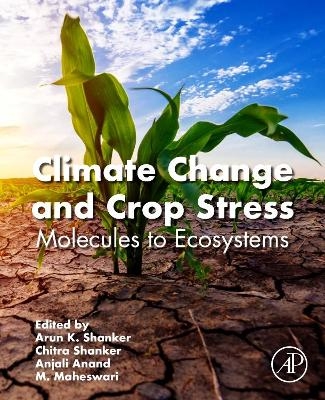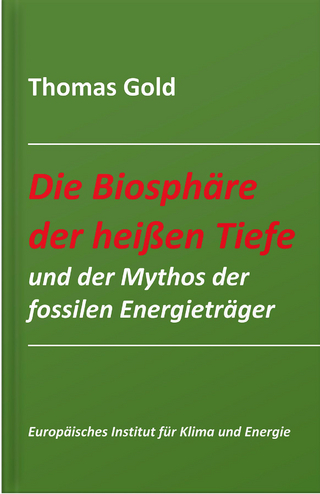
Climate Change and Crop Stress
Academic Press Inc (Verlag)
978-0-12-816091-6 (ISBN)
Arun K. Shanker is serving as a Principal Scientist (Plant Physiology) with the Indian Council of Agricultural Research (ICAR) at the Central Research Institute for Dryland Agriculture in Hyderabad, India. He is working with the ICAR as a full time researcher since 1993 and has since earned his advanced degree in Crop Physiology from Tamil Nadu Agricultural University while in service. He has been awarded the prestigious Fellow of the Royal Society of Chemistry (FRSC), by the Royal Society of Chemistry, London in 2018 and the Fellow of the Royal Society of Biology (FRCB) in 2018. He is an Endeavour Executive Fellow of the Department of Education and Training, Government of Australia and has been awarded the Commonwealth Star by the Australian Government. He is a Plantae fellow of the American Society of Plant Biologists. He is listed in the top 2 percent of the world scientists for the year 2019 in a Stanford study. He is presently working on systems biology approach to study the mechanism of abiotic stress tolerance in crops. His main focus now is to unravel the mechanism of drought and heat stress response in plants to tackle climate change related threats in agriculture. Dr Chitra Shanker is serving as Principal Scientist (Entomology) at the Indian Institute of Rice Research ( ICAR-IIRR) under the Indian Council of Agricultural Research (ICAR). She holds a PhD in Agricultural Entomology from Tamil Nadu agricultural University, Coimbatore. She has been with ICAR from 1994 and has worked in various places in India. She is an Endeavour Executive Fellow of the Department of Education and Training, Government of Australia and has been awarded the Commonwealth Star by the Australian Government. Dr Chitra Shanker has been working on habitat management strategies to enhance biological control in rice. Her field of specialization is the study of the biodiversity of agroecosystems, their functional significance and utilizing the ecological services provided by this biodiversity. Her aim is enhancing natural control of insect pests in agricultural systems through habitat management and reduce insecticide use. Anjali Anand is serving as a Principal Scientist (Plant Physiology) with the Indian Council of Agricultural Research (ICAR) at the Indian Agricultural Research Institute (IARI), New Delhi. She has been working with the ICAR as a full time researcher since 1995. Her main area of research is Climate change, Seed physiology, and Abiotic stress physiology. Her significant contribution in this area has been on the role of amylases in nocturnal starch breakdown in rice under high night temperature, physiology of temperature induced spikelet fertility in rice, elevated CO2 and its effects on sunflower. Her special contribution is on static magnetism and its effects on seed physiology of various crops. She has over 25 highly cited papers in impact factor journals and is handling several institute and externally funded projects in the broad area of climate change and crop abiotic stress. Anjali Anand has been awarded the prestigious Delhi University PG fellowship, outstanding academic performance during M.Sc., IARI, outstanding presentation of Research contribution in IARI, Fellow of Indian Society for Plant Physiology and best paper awards by Society for Advancement of Human and Nature and Fertilizer Association of India. She has served as the Editor, Indian Journal of Plant Physiology from 2010-2016. M. Maheswari is the former Director of ICAR-Central Research Institute for Dryland Agriculture (CRIDA), Hyderabad, India. She has 130 articles including research papers in high impact international journals, book chapters, reviews, bulletins etc. Co-edited one book on Crop Stress Management- Springer. She has been awarded the prestigious Panjabrao Deshmukh Woman Agricultural Scientist Award of ICAR in 2005. Her main area of work is high throughput plant phenotyping, transgenic sorghum for drought tolerance and adaptive mechanisms including compensatory growth responses, recovery patterns in water relations and carbon and nitrogen metabolism in a wide range of rainfed crops such as sorghum, pearl millet, groundnut, sunflower, blackgram, greengram, cowpea and cluster bean.
1. Breeding Climate Resilient Crops for Abiotic Stresses 2. Drought and Heat stress in combination in a changing climate 3. Elevated atmospheric CO2 induced changes in nitrogen metabolism and crop quality 4. Combined Salinity and Waterlogging Stress in Plants: Limitations and Tolerance Mechanisms 5. Drought stress in sorghum: impact on grain quality 6. Drought stress tolerance in Cotton: Progress and perspectives 7. Root System Architectural and Growth Responses of Crop Plants to Mineral Nutrition Under Moisture Stress and its Implications in Drought Tolerance 8. High temperature stress in wheat due to climate change, effect, plant breeding strategies 9. Relevance of Ear and Ear-Related Traits in Wheat Under Heat Stress 10. Air Pollution Mitigation and Global Dimming: A Challenge to Agriculture under Changing Climate 11. Insights into the Physiological and Biochemical Responses to Abiotic Stress during Seed Development 12. Cereal grain composition under changing climate 13. Molecules to Ecosystems - Recent Trends in Chemical Ecology for Combating Biotic Stresses in a Changing Climate? 14. Chloroplast Evolution and Genome Manipulation 15. Seed priming to enhance salt and drought stress tolerance in plants: Advances and Prospects 16. Molecular Approaches for Improving Abiotic Stress Tolerance in Sugarcane 17. Carbon Isotope Discrimination Studies in Plants for Abiotic Stress 18. DNA Methylation in Plants and Its Role in Abiotic Stress Tolerance
| Erscheinungsdatum | 26.11.2021 |
|---|---|
| Verlagsort | San Diego |
| Sprache | englisch |
| Maße | 191 x 235 mm |
| Gewicht | 1220 g |
| Themenwelt | Naturwissenschaften ► Biologie ► Biochemie |
| Naturwissenschaften ► Biologie ► Ökologie / Naturschutz | |
| Naturwissenschaften ► Geowissenschaften ► Meteorologie / Klimatologie | |
| Weitere Fachgebiete ► Land- / Forstwirtschaft / Fischerei | |
| ISBN-10 | 0-12-816091-8 / 0128160918 |
| ISBN-13 | 978-0-12-816091-6 / 9780128160916 |
| Zustand | Neuware |
| Informationen gemäß Produktsicherheitsverordnung (GPSR) | |
| Haben Sie eine Frage zum Produkt? |
aus dem Bereich


